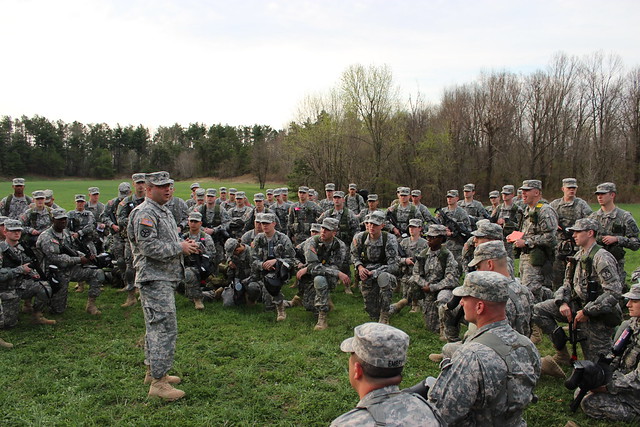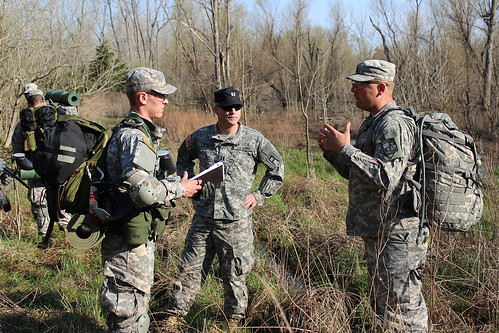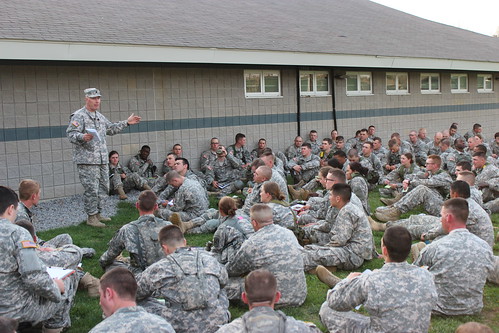Story by Sgt. 1st Class Dennis Anderson, 238th Regiment Unit Public Affairs Historian Representative
[caption id="" align="aligncenter" width="574"]

Staff Sgt. John Riggi, Training NCO for the Kentucky National Guard's Officer Candidates' School speaks to candidates and cadets from Army ROTC programs at Western Kentucky and Murray State Universities during a field training exercise at the Wendell H. Ford Regional Training Center in Greenville, Ky., April 11, 2014. The collaborative training was a first in Kentucky to combine the multiple programs. (U.S. Army National Guard photo by Sgt. 1st Class Dennis Anderson)
GREENVILLE, Ky. -- In a unique combination of the future Army leaders, Soldiers with the Kentucky National Guard's Officer Candidate School trained alongside cadets from ROTC programs in the commonwealth during a field exercise at the Wendell H. Ford Regional Training Center in Greenville, Kentucky, April 10-13, 2014.
Cadets from Western Kentucky and Murray State Universities gathered at the training site for an annual weekend in the field. The Kentucky Guard's 238th Regiment took the opportunity to invite the ROTC programs to Greenville and mingle their own officer candidates with the cadets for some enhanced combined training.
[caption id="" align="alignright" width="368"]

Sgt. 1st Class Andrew Black (right), a military science instructor at Western Kentucky University gives guidance to a ROTC cadet during a field training exercise at the Wendell H. Ford Regional Training Center in Greenville, Ky., April 11, 2014. According to WKU staff members, training with Kentucky National Guard officer candidates was beneficial for both military learning and as a cost-saving plan for the ROTC programs. (U.S. Army National Guard photo by Sgt. 1st Class Dennis Anderson)
“The weekend is a consolidation of ROTC Students and our OCS candidates to refine and help develop skills that are relevant to today's battlefield with regards to student taught lanes training," said Lt. Col. Todd Neal, commander of the
2nd Modular Training Battalion, 238th. "Hopefully it will also develop other skills for them to become better future officers."
Neal said while the two programs are different, the end goal is still the same. And the combination was well received by the cadets and candidates in the training. Sgt. 1st Class Andrew Black, Military Science Instructor at WKU said working with unfamiliar faces would serve them well in their careers and would remind them that they are not alone in their chosen path.
"Ultimately, the exercise allows them to come together as a team, rely on the person to their left and right…know that it is not just them going through these hard times, hard training, difficult training by themselves, this isn’t something they can gain from a classroom," said Black.
According to Sgt. 1st Class Anthony Kennedy, Operations NCO for the 238th, the blending of the Soldiers was a first in Kentucky and that it was not only a benefit for the training environment, but also as a cost-saving method for the ROTC programs.
"The ROTC programs had been looking for a closer, more economical way to conduct their field training exercise, they immediately accepted the invitation," said Kennedy. "We are very optimistic that we can develop this into a reoccurring annual event."
The Soldiers spent the two days in the field moving through the land navigation course and a variety of platoon and squad level operations such as maintaining security of their area. Cadets and candidates agreed the hands on exercise would be very beneficial for them and their careers.
[caption id="" align="alignleft" width="340"]

Lt. Col. Scott Walker, Professor of Military Science and Battalion Commander for the ROTC programs at both Western Kentucky and Murray State Universities speaks to cadets and Kentucky National Guard officer candidates following a field training exercise in Greenville, Ky., April 13, 2014. (U.S. Army National Guard photo by Sgt. 1st Class Dennis Anderson)
Capt. Lincoln Ward, Assistant Professor of Military Science at WKU also echoed the mutual benefits of the collaboration, both for the Soldiers and the costs. Ward said WKU was thankful the Kentucky Guard provided them the opportunity and called the Guard's support outstanding.
"The groups of future officers will, without a doubt become better lieutenants because of this training exercise," he said. "The partnership we have established here between the programs is one we look to sustain and expand in the coming years."